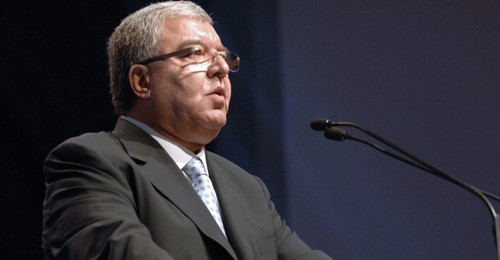 Lebanon Interior Minister Nouhad al-Mashnouq said Tuesday after a meeting in Maarrab that there is no deal on a new electoral law in sight before the expiry of the deadlines, stressing that an extension of the parliament’s term will be needed but will be “brief” and for technical reasons.
Lebanon Interior Minister Nouhad al-Mashnouq said Tuesday after a meeting in Maarrab that there is no deal on a new electoral law in sight before the expiry of the deadlines, stressing that an extension of the parliament’s term will be needed but will be “brief” and for technical reasons.
“The meeting is part of the consultations with the leader of the Lebanese Forces amid the current circumstances in the country, whether regarding the elections, the threats or the appointments,” said Mashnouq after talks with LF leader Samir Geagea in Maarab.
“I like to hear his opinion seeing as he has balanced stances and I hope these standards will be endorsed in all the coming junctures,” the minister added.
As for the electoral law, Mashnouq said: “There is nothing new in this regard and I hold onto my opinion that I see no possibility for an agreement on a new electoral law.”
Asked whether his remarks indicate that the elections will be held under the controversial 1960 electoral law, the minister said the decision belongs to the parliament and government.
“Any postponement of the elections will be for technical reasons and for a brief period, seeing as the country cannot withstand a long postponement and no one can take the blame for undermining Lebanon’s reputation and the State’s credibility abroad,” Mashnouq added.
The Iranian backed Hezbollah has repeatedly called for an electoral law fully based on proportional representation but other political parties, especially the Future Movement, have rejected the proposal and argued that the party’s controversial arsenal of arms would prevent serious competition in regions where the Iran-backed party has clout.In 2013 Lebanese Forces and The Future Movement backed by the PSP agreed on a hybrid electoral law which calls for 54% of the MPs to be elected under the majoritarian winner-takes-all system and 46 % under the proportional representation system. This draft law was rejected by the Hezbollah-led March 8 opposition.
Also in 2013 Future Movement leader PM Saad Hariri rejected the electoral law that is based on proportional representation because there will be competition in some regions, but there cannot be any competition in other regions, because of the presence of Hezbollah weapons in them.
Hariri was referring to the 2009 election in the areas dominated by Hezbollah. According to the reports that surfaced back then Hezbollah gunmen prevented their rivals from voting and the results of the election showed it. On the other hand in the March 14 dominated areas several Hezbollah backed candidates won the election that was based on winner take all . In a proportional representation system Hezbollah will be able to gain more seats in the March 14 dominated areas but will not lose any seats in its dominated areas as long as it is allowed to keep its arms and use them internally for political gain .
According to analysts Hezbollah is trying to use President Michel Aoun to dominate Lebanon by insisting on adopting the proportional law in a single or several expanded electoral districts.
The country has not voted for a parliament since 2009, with the legislature instead twice extending its own mandate.
The 2009 polls were held under an amended version of the 1960 electoral law and the next elections are scheduled for May 2017.
Constituent Assembly
There are rising concerns in Lebanon that if current situation leads to a parliamentary vacuum there will be no choice but to demand a constituent assembly to change the country’s constitution and its political system.
Hezbollah chief Hassan Nasrallah called for a constituent assembly in June 2012 to build a “real state”, as he put it. This is something that March 14 views as an attempt by Hezbollah to impose a Sunni-Shia-Christian status quo on the Lebanese political system, rather than the Christian- Muslim parity that is enshrined in the Taif agreement constitution.
The March 14 alliance rejects any constituent assembly at this time, saying that the current circumstances would not allow for a balanced debate due to Hezbollah’s ability to bring its arms into play. They are concerned that Hezbollah has a clear agenda of its own that aims to change the status quo in Lebanon and impose a political system that is more in line with Iran.
Dr. Elias Abou Assi, political science professor at the Saint Joseph University, was quoted as saying in June 2014 “the very idea of the constituent assembly represents a coup endeavor and a sort of a plot to destroy the foundations upon which Lebanon is built.”
Worse than vacuum
The Change and Reform parliamentary bloc (which is headed by president Aoun ) stressed Tuesday that the 1960 electoral law or another extension of the parliament’s term are both “worse than vacuum,” MP Ibrahim Kanaan , Change and Reform secretary , said after the bloc’s weekly meeting in Rabieh.
“To us, extension and the 1960 law are both worse than vacuum,” Kanaan said.
But Speaker Nabih Berri has announced in recent days that elections under the 1960 law would be better than parliamentary vacuum.
Several political parties are meanwhile discussing a hybrid electoral law that mixes proportional representation with the winner-takes-all system.

Leave a Reply
You must be logged in to post a comment.